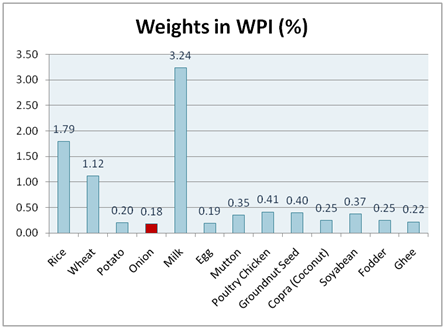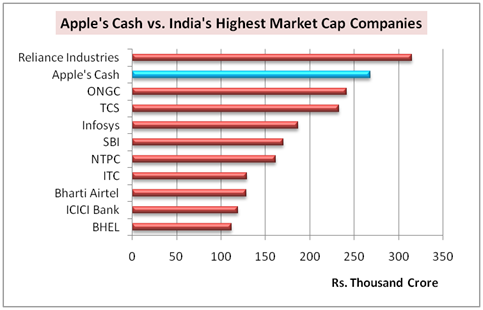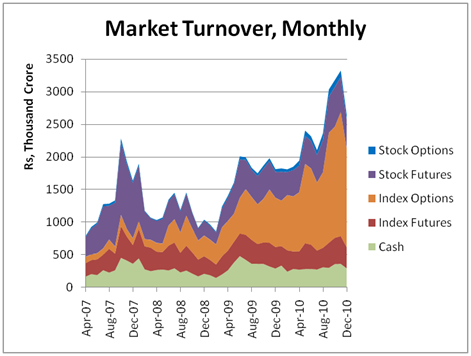My latest column at Yahoo! is “Did You Know?“
(Reproduced in full)
It’s interesting to put a context to numbers, news headlines and indeed, data in general.
Did you know: Onions + Potatoes < Chicken
In the Wholesale Price Index, which is our only real measure for Inflation at this point, each item is “weighted” to resemble what India might spend. Every item gets a weight which reflects the importance of the price movement of that item, and the weights add up to 100.
Onions, our pet headline, have gone up substantially, which hurts a heck of a lot, you think. But let’s look at the weights of Onion compared to, say, other things in the general “Food” area.
(Data: Office of the Economic Adviser)
Effectively, we weigh Onions very low — lower than Potatoes, Eggs, Ghee, Rice and everything else on this graph. Potatoes and Onions together are no match for Chicken in the WPI. Chawal and Atta are what make us tick, you might think, but it’s the cows that block your highway that are far more important — Milk is bigger than Rice and Wheat combined. Did you know?
Or, perhaps, it wasn’t the onion’s weightage; perhaps it was the fact that the prices moved So much, that even someone at the RBI mentioned it in their press conference yesterday. But that seems to be a media creation, because the data shows we need to be worried about other things. Here’s the Year on Year price increase in different commodities between December 2009 and December 2010, appropriately multiplied by the WPI change.
(Data: Office of the Economic Adviser)
We should be worried about those cows, really. Look at what Milk has done! And I sympathize with SUVs, and People who buy cotton shirts and yes, those Chicken Do Pyaaza eaters.
Did you know: Apple’s Cash Hoard can buy any Indian Company, save one.
Recently Apple declared its results in the US, and highlighted in them was the small point that they have cash reserves of $59.6 billion. That, if converted to Indian Rupees at Rs. 45 per dollar, gives them enough money to buy, uhm, nearly any listed Indian company.
(Data: NSE, Apple Data releases)
Note: That is just the cash they have; not their own market cap, which is considerably higher. (Apple has no debt) Also note that this is just a theoretical discussion — there is no way that Apple will actually buy any of these companies because it would a) drive up the price beyond their reach, b) change the dollar-rupee equation and c) are you kidding me.
But it provides a context. Financial superpower-dom is at least a while away.
Did you know: It’s all in the Options.
Markets have been really active recently, and more and more Indians are buying stocks every day. Or so we think when they show us figures like Rs 140,000 crores traded every day” and so on. But on a closer look, the trading volumes are slightly skewed.
(Data: NSE)
Compared to 2007, Cash and Index Futures turnover are largely the same; Stock futures have taken a bit of a beating (even though a lot more securities exist today) and the big gainer has been Index Options. But that isn’t really turnover. Let me explain.
When you buy an option, you pay just the premium — you might pay Rs. 50 to buy a 6,000 Call Option on the Nifty; i.e. you can buy Nifty at 6,000 even if it went to 6,500 — and make the difference. What is recorded as turnover isn’t the Rs. 50 — it’s the 6,000. And a number of options are bought and sold deep-out-of-the-money — that is, options very far away from the current price. So even if the premium exchanged was Rs. 100 crores, the turnover might show 10,000 crores. Notional values inflate turnover figures substantially.
A good portion of these turnover figures are inflated anyway. A number of intraday traders are given 4x to 10x leverage, even in the cash market, by brokers to do two-way transactions within the trading day; that is, they put up 10,000 rupees and they can buy and sell stocks worth 100,000 rupees, if they square off the transaction within the trading day. This obviously adds to turnover as well, but it is more tangible than options turnover.
Did you know: 95.78% of all statistics are made up?
***
Comments deeply appreciated.
More Yahoo Columns:
- Reconsider That Fixed Deposit (Comments)
- Market Interventions (Comments)
- ULIPs or Mutual Funds? (Comments)
- Taking Stock of Commissions (Comments)
- Innovations and Curses (Comments)
- Free Money (Comments)
- The Illusion of Low Risk (Comments)
- Tips about the Tipsters (Comments)
- The Good, Bad and Ugly of Credit Cards (Comments)
- The Problem with Multi-Level Marketing (Comments)
- Planning for the Grim Reaper (Comments)
- Of Options and Choices (Comments)
- Riding the Equity Wave (Comments)
- The Art of Picking Stocks (Comments)
- (The Whole Lot)







